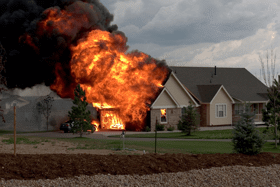Each year in the United States, we celebrate the Fourth of July with community parades, picnics, barbecues, and fireworks - the things of which happy memories are made. But sadly, Independence Day also includes tragic events and injuries resulting from illegal fireworks use and is both traumatizing and harmful to children, animals, and a growing number of war veterans who deserve our loyalty the most. National Fireworks Safety Month is a good time to familiarize yourself with the dangers of fireworks and the best practices if you are planning on setting off your own display.
What is National Fireworks Safety Month?
National Fireworks Safety Month occurs every June and runs through the Fourth of July to remind communities that setting off your own fireworks could be deadly. According to recent statistics from the National Fire Protection Association (NFPA), over one-quarter of fires started by fireworks were reported on the Fourth of July. That is why it is so important to follow the advice of the NFPA: leave the fireworks to the professionals!
Fireworks Safety Tips
Fireworks are dangerous and should be treated as such. Proper care must be taken if you are planning on setting off fireworks for July 4th or any other celebration. These fireworks safety recommendations will help you stay safe if you are preparing to use them during your festivities.
Obey your local laws
If fireworks are not legal to buy in your area, they are illegal for a reason. Do not set off your own display. Instead, let the experts impress you with their safe fireworks shows. If they are legal in your area and you choose to use them, do so safely with the rest of these tips in mind.
Legal fireworks may be purchased only from Oregon permitted fireworks retailers and stands. Oregon law forbids the possession, use, or sale of fireworks that fly, explode or travel more than six feet on the ground or 12 inches in the air. Bottle rockets, Roman candles, and firecrackers are ILLEGAL in Oregon. Most states don’t have blanket bans on fireworks, but cities, counties, and jurisdictions will typically have their own rules. Familiarize yourself with your city’s fireworks rules before you set anything off.
Read all directions and cautionary labels on the packaging
Never light a firework without first reading its directions. Responsible usage is key to avoiding the burns, cuts, sprains, fractures, or worse injuries associated with amateur fireworks. While you're examining the packaging, pay attention to warning labels, too. As a general rule, these explosive devices aren't intended for children to handle, and firework products typically recommend keeping pets safely inside and away from the show.
Only use fireworks outdoors
Setting off a firework in your home is asking for a fire. If you choose to do this, you may potentially face fire and property damage, damage to your neighbor's property, city fines, increased risk of injury, and even death. To avoid all these risks, only use fireworks outside in an open area. The space should be far away from buildings, vehicles, children, and animals to keep everyone safe.
Do not use fireworks near dry grass or foliage
The summer sun has a way of drying out grass, leaves, and plants. Since recent temperatures have been uncharacteristically scorching here in Oregon, take a close look at the area where you plan to launch the fireworks. We recommend performing this examination in daylight for a full, clear understanding of the area's risk of fire. If dry grass or foliage is found, do not light off your display there. These items will behave like kindling if touched by any stray sparks, putting you at risk of fire. Dry debris like this can catch on fire quickly with just a single spark. Rake, weed, and remove any of the dried foliage, while moving any flammable to a safe distance away. Remember to empty your gutters, as dry leaves can congregate there and cause a fire.
Do not set off fireworks near buildings
A rogue firework could easily set a building on fire, shattering its windows, injuring residents, and much more. Respect your neighbors' properties by keeping your fireworks away from their homes and businesses. You should also keep fireworks away from power or gas lines, as these can ignite a fire upon impact. Instead, only use fireworks in a wide, open field that's free from any dried or otherwise combustible materials.
Keep a large bucket of water close by
If things go awry, it's necessary to be prepared. During your fireworks show, make sure to always have a bucket of water, a hose, or a fire extinguisher on hand. That way, if a fire starts, you can put out the flames immediately. Never light fireworks without a fire extinguisher ready to put out the fire. If a fire starts, call the fire department immediately to help and ensure that all danger has been stifled.
Fireworks Safety Is Important
If you choose to set off your own fireworks displays, do your part during National Fireworks Safety Month first. Read up on all the fireworks safety tips you should know before lighting off any fireworks to prevent the worst from happening. In the wrong setting, flying sparks can set off dry foliage and move quickly to neighboring houses. Because many people like to set off fireworks in their neighborhoods, this can turn into a disaster—quickly. Fire can cause non-obvious issues to your home, as well, such as discolored walls, broken windows, corrosion from smoke, and odors that cannot be easily removed.
If you have fire damage to your home as a result of fireworks, reach out to the experts at ServiceMaster Restore. We are ready to help you recover from damage to your home or business. From the members of ServiceMaster Restore, we hope you have a fun, happy, and safe Fourth of July!


